|

SILENT
SENTINELS — The whale bones at Point Hope's west Qalqi
were the center of last weeks whaling feast.
Point Hope celebrated the harvest of four bowhead whales last spring.
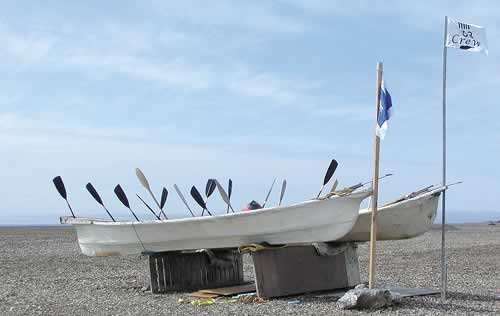 |
|
HANDS
UP IN PRAYER—The feast started with putting up the skinboats
used in whale hunting up on racks, symbolizing the end of
this spring's whaling season. Successful crews such as the
Rock and Frankson crew of the Qalqi (clan) Qagmaktuuq arrange
the paddles pointing skyward. Upright paddles symbolize outstretched
arms in thankful prayer.
|
|
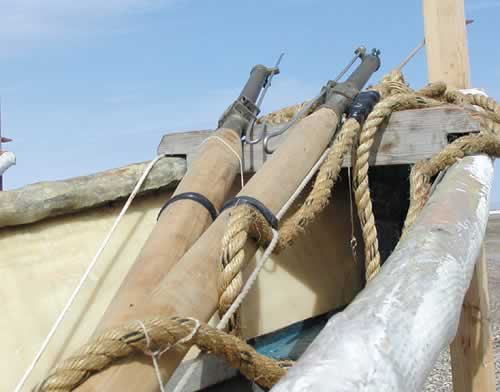 |
|
TOOLS
OF THE TRADE—In whale hunting, the people of Point Hope
still use harpoon guns. Once the whaler strikes, a crew member
throws the buoy attached by rope to the gun into the water
to track the whale.
|
|
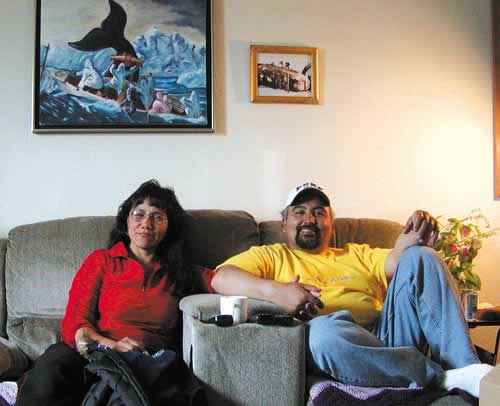 |
|
WHALING
CAPTAINS—Ramona and Rex Rock only had a short minute
to relax in the midst of preparing for the feast.
|
|
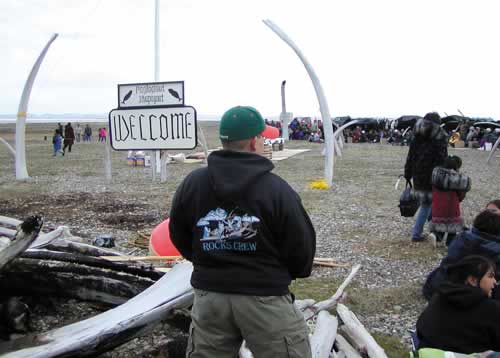 |
|
WHALEBONES—Point
Hope has two clans with separate campsites, marked by whalebones
year around. The clan of Qagmaktuuq celebrated on the east
site of town joined by folks from Noatak, Kivalina, Kotzebue,
Nome, Anchorage and Selawik.
|
|
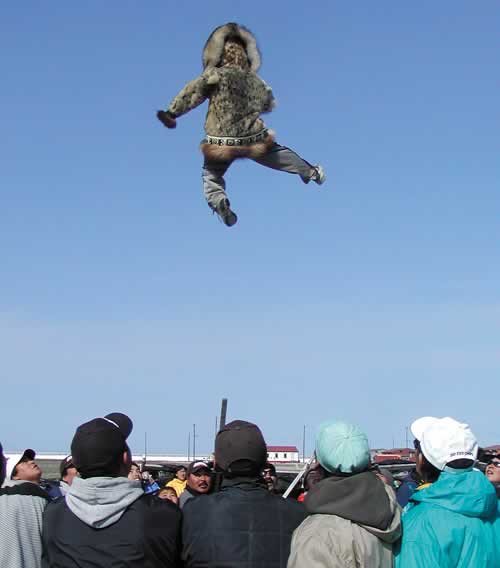 |
|
FLYING
HIGH—Michael Tuzroyuluk of Point Hope is catapulted up
in the air at the whaling feasts blanket toss ceremony. Read
more about the meaning of the blanket toss and why it is important
to whalers and young mothers of sons in next week's paper.
|
The
King Air's monotonous buzzing has a tranquilizing effect, but
watching the landscape change underneath is like sitting in a time
machine. Going directly from Nome to Point Hope means leaving budding
spring and green hills behind and following the winter, sending
its chilly breath over Point Hope high above the Arctic circle.
The
foothills of the Brooks Range still wear a camouflage of white snow
patches on brown earth. On the ocean, sheets of ice look like precious
chinaware broken into a million small pieces.
After
almost two hours, the airplane circles over a sandspit, pointing
like a finger into the cold ocean. Ice-free in the south, still
covered with yellowish ice floes on the north side of the spit.
As the plane flies low, a graveyard comes into sight. It has whalebones
as tombstones. Hundreds of whalebones arching skyward resemble silent
sentinels protecting the dead.
Whales
are the guardians in life and death. This is the first indication
that Point Hope is a whaling community through and through. Not
only because they hunt whales to feed their people. No, it's
because the entire lifestyle centers around the dependency on the
gift of whales. Over the centuries of uninterrupted whaling, Tikigaq's
destiny merged with that of the cetacean giants to the point where
a distinction between physical appearance and spiritual reality
ceases to exist.
Father's
Day weekend was a very special time for Point Hope. This spring,
their four whaling crews caught as many whales. Also, for one whaling
crew, it was the first whale catch.
Devoutly
following tradition, Rex Rock Sr. had waited until his father Elijah
Rock turned over his boat to his oldest son this year. Although
Rex Rock has hunted whales all his life, being whaling captain is
a whole different ballgame for him and his family. "It's
a great honor to be a whaling captain," says his wife Ramona Rock
as she's busy preparing tons of food for the upcoming three-day
feast. It's an honor that comes with great responsibility and
a strict code of conduct throughout the year.
Says
Ramona, "It's a year-round preparation starting with sewing
ugruk skins for the boats, making sure that the animals are hunted
in a good way, to butchering and sharing the meat, to preparing
the feast and feeding the people." And all is done with a prayer.
At
this time, the Rock's home is like a beehive. People of all
ages come and go, bring food, help bake cakes or just relax on the
couch watching CNN news on the big screen TV.
A
painting depicting a whaling scene hangs on the wall above the couch,
where Ramona rests for a second, already near exhaustion. Her hands
are always busy. Now she sews a ruff on her daughter's parkie.
She
admits shyly that she feels nervous about her new role as the whaling
captain's wife. So many traditions to follow, so many rules
to obey. Since this is their first whale, tradition calls for giving
away the entire whale to other whaling crews and distributing the
meat among widows and women that have nobody who hunts for them.
The
only part left for the Rocks is the lip and some baleen of the 28-foot
bowhead whale. "When you catch your first whale, the elders
can come to you and ask for anything in your possession," Ramona
explains." The elders have powerful prayers and they are very
important in our society." The elders came by and claimed the
Rock's 4-wheeler, Ramona's sewing machine, wolverine furs,
a KitchenAid and a meat rack among other things.
Her
husband Rex comes in followed by his son Rex Jr., a 23-year-old
student at UA majoring in biology and law. Young Rex as well as
his sister Rachel come home from school in Anchorage once whaling
season comes around and help their family.
Rex
and his son just finished cutting up the ugruk skins that used to
cover the skinboats and that are now turned into the blanket for
the upcoming ritual of the blanket toss. Amidst all the chaos on
this day before the feast, Rex Rock takes the time to sit down and
talk about how he caught the whale that all the hoopla is about
now.
It
was on Easter Sunday, whaling season has just started and the ice
was good. "We went out at about 7 a.m. We took the boat out,
set up camp and waited all day long in the boat. We saw a lot of
beluga and some whales.
"I
was alone with my Dad in the boat. Suddenly the whale surfaced right
next to our boat. I took out the harpoons and thought at the same
time, ‘it's a gift'! I struck once; the bomb went
off and almost tipped the boat. We let the buoy out and then watched
as it slowly disappeared under the ice. Dad said, ‘Pray!"'
After
fifteen minutes, the whale surfaced again, offering himself to be
taken for the people. Other whaling crews hustled to the scene to
finish the job and soon the churchbells rang to let the village
know about the catch.
Leaving
the house, it is almost midnight. Children are still playing in
front of their houses, jumping on trampolines or riding their bikes
and dodging fast 4-wheelers racing along the few roads. The fog
has lifted and the sun is out, but a cold north wind still blows,
chasing clouds of dust across the town built on sand and gravel.
Tomorrow the feast will begin.
Read
more in next week's Nome Nugget about the feast and the intricate
system of customs and beliefs centered on the great whales in Point
Hope.
|


![]()

